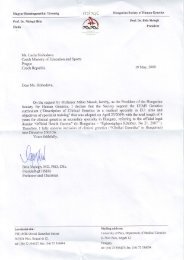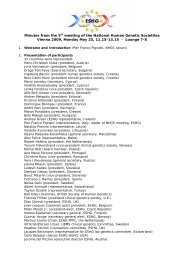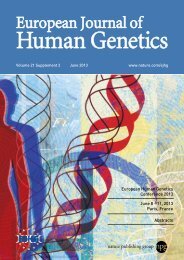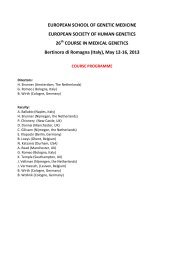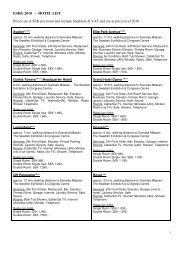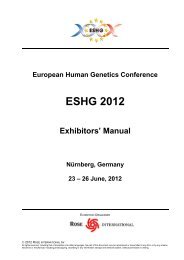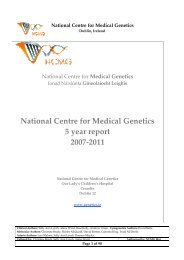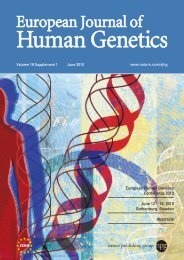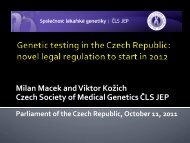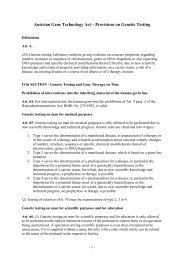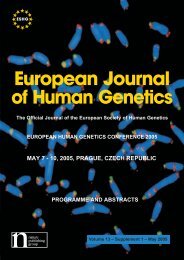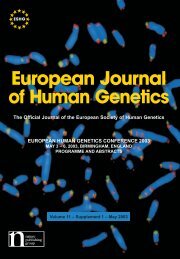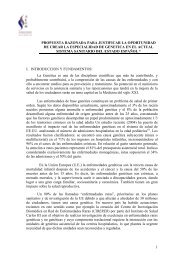2008 Barcelona - European Society of Human Genetics
2008 Barcelona - European Society of Human Genetics
2008 Barcelona - European Society of Human Genetics
You also want an ePaper? Increase the reach of your titles
YUMPU automatically turns print PDFs into web optimized ePapers that Google loves.
Cancer genetics<br />
P04.112<br />
NBS 657del5 mutation in patients with myelodysplastic<br />
syndromes (mDs)<br />
B. Jekic 1 , L. Lukovic 1 , B. Popovic 2 , I. Novakovic 1 , J. Milasin 2 , T. Damnjanovic 1 ,<br />
N. Maksimovic 1 , A. Bogdanovic 3 , V. Bunjevacki 1 ;<br />
1 Institute <strong>of</strong> <strong>Human</strong> <strong>Genetics</strong>, School <strong>of</strong> Medicine, University <strong>of</strong> Belgrade, Belgrade,<br />
Serbia, 2 Institute <strong>of</strong> Biology and <strong>Human</strong> <strong>Genetics</strong>, School <strong>of</strong> Dentistry,<br />
University <strong>of</strong> Belgrade, Belgrade, Serbia, 3 Institute <strong>of</strong> Hematology, Clinical Center<br />
<strong>of</strong> Serbia, Belgrade, Serbia.<br />
Myelodysplastic syndromes (MDS) are the most common group <strong>of</strong><br />
hematological disorders in persons older than 60-year age . MDS are<br />
characterized by elevated apoptosis in bone marrow and peripheral<br />
blood cytopenias . Since more than one third <strong>of</strong> all MDS patients develop<br />
acute leukemia MDS are considered preleukemic states .<br />
NBS1 gene encodes for the nibrin (p95 protein) . p95 acts in a doublestrand<br />
DNA break repair as the part <strong>of</strong> MRE11/RAD50 double-strand<br />
break (DSB) repair complex . Nibrin is involved in cell cycle checkpoint,<br />
meiotic recombinations and telomere maintenance .<br />
NBS1 gene mutations are recognized as a main molecular event in<br />
development <strong>of</strong> Nijmegen breakage syndrome (NBS) . NBS is chromosome<br />
instability syndrome resulting in microcefaly, growth retardation,<br />
immunodeficiency and predisposition to different types <strong>of</strong> cancer. NBS<br />
patients have a particularly high predisposition to lymphoid malignancy<br />
.<br />
Independently from Nijmegen breakage syndrome, alterations <strong>of</strong><br />
NBS1 gene sequence (mostly nucleotide substitutions and deletions)<br />
and expression are found in number <strong>of</strong> malignancies . Deletion <strong>of</strong> 5bp<br />
in exon 7(657del5) is the most <strong>of</strong>ten NBS1 gene mutation found in<br />
Slavic population (so-called Slavic mutation) .<br />
In this study we have analyzed NBS1 657del5 mutation in a cohort<br />
<strong>of</strong> 71 MDS patients . Patients DNA were obtained from bone marrow<br />
microscope slides splices . To detect mutation we have compared PCR<br />
products <strong>of</strong> MDS patients DNA with control DNA containing NBS1<br />
657del5 mutation . Only one patient harbored mutation . According to<br />
this study, NBS1 657del5 mutation may not be important event in evolution<br />
<strong>of</strong> MDS .<br />
P04.113<br />
A pediatric mDs patient with 5q31 deletion<br />
H. Acar1 , U. Calıskan2 , T. Cora1 , Ö. Balasar1 , C. Ucar2 ;<br />
1Dept. <strong>of</strong> Medical <strong>Genetics</strong>, Meram Medical School, Selcuk University, Konya,<br />
Turkey, 2Dept. <strong>of</strong> Pediatric-Hematology, Meram Medical School, Selcuk University,<br />
Konya, Turkey.<br />
Myelodysplastic syndrome (MDS) includes the ineffective proliferation<br />
or production <strong>of</strong> cells in bone marrow (BM) leading to peripheral blood<br />
cytopenia and a preleukemic state . The pathogenesis <strong>of</strong> MDS involve<br />
a multistep process involving two or more genetic alterations that lead<br />
to alteration in cellular function that cause clonal proliferation <strong>of</strong> an abnormal<br />
stem cell . In the present study, we report on a childhood patient<br />
with MDS . The patient had 5q31 deletion by conventional cytogenetics<br />
and fulorescence in situ hybridization (FISH) analysis with a specific<br />
FISH probe at the diagnosis . We present the clinical features, genetics<br />
and immunologic analysis at the diagnosis and also followed-up<br />
results .<br />
P04.114<br />
FisH studies in multiple myeloma patients<br />
O. O. Yuregir 1 , F. I. Sahin 1 , Z. Yilmaz 1 , E. Kizilkilic 2 , S. Karakus 2 , H. Ozdogu 2 ;<br />
1 Baskent University Faculty <strong>of</strong> Medicine Department <strong>of</strong> Medical <strong>Genetics</strong>,<br />
Ankara, Turkey, 2 Baskent University Faculty <strong>of</strong> Medicine Department <strong>of</strong> Adult<br />
Hematology, Ankara, Turkey.<br />
Multiple Myeloma (MM) is a heterogeneous disease regarding its<br />
clinical and genetic properties . Cytogenetic studies are valuable diagnostic<br />
tools in MM patients both at the time <strong>of</strong> diagnosis and during<br />
clinical follow up. Although conventional karyotyping is the first choice,<br />
fluorescent in situ hybridization (FISH) is also important in detecting<br />
abnormalities that cannot be detected by karyotype analysis . Conventional<br />
cytogenetic analysis and FISH results <strong>of</strong> bone marrow samples<br />
<strong>of</strong> 36 MM patients at the time <strong>of</strong> diagnosis have been evaluated in<br />
the current study . Three probes for chromosome 13q (RB1, D13S319,<br />
D13S25), one for 14q32 (IgH) and one for 17p13 (p53) have been<br />
used for hybridization with fixed cells. Conventional cytogenetic results<br />
revealed that 20 patients (55 .5%) had normal karyotypes, whereas 8<br />
(22 .2%) had numerical or structural chromosomal abnormalities . We<br />
did not find appropriate metaphases for chromosome analysis in 8<br />
(22 .2%) patients . FISH analyses revealed at least one or more abnormal<br />
results in 25 (69 .5%) cases, whereas 11(30 .5%) cases had no<br />
abnormal findings. 14q32 rearrangement was the most common finding<br />
in FISH analyses and has been detected in 21 cases (58 .3%) .13q<br />
deletion and 17p deletion have been detected in 11 (30 .5%) and 5<br />
(13 .9%) cases, respectively . In evaluating MM patients, FISH studies<br />
including 14q32 and 17p13 chromosome regions may yield quite significant<br />
results during clinical follow up <strong>of</strong> the disease which has a<br />
multistep pathogenesis .<br />
P04.115<br />
Cytogenetic studies among patients with myelodysplastic/<br />
myeloproliferative diseases<br />
M. Khaleghian, C. Azimi;<br />
Department <strong>of</strong> <strong>Genetics</strong>, Cancer Institute, Imam Khomeini Medical Cener,<br />
School <strong>of</strong> Medicine, Medical Sciences / University <strong>of</strong> Tehran, Tehran, Islamic<br />
Republic <strong>of</strong> Iran.<br />
The myelodysplastic/myeloprolliferative diseases (MDS/MPD) are<br />
clonal myeloid disorders that possess both dyspastic and proliferative<br />
features . Clinical symptoms are caused by complications resulting<br />
from cytopenia, dysplastic cells with abnormal function, leukemic<br />
infiltration <strong>of</strong> various organ systems, fever and malaise.<br />
We are reporting the chromosome studies among 34 patients which<br />
referred to us with diagnosis <strong>of</strong> MDS/MPD by Hematologists/Oncologists<br />
during the last 12 months . Chromosome preparations were obtained<br />
from lymphocyte cultures and analyzed after GTG-banding and<br />
HR-banding .<br />
30 patients (88 .24%) showed normal karyotype . 4 patients (11 .76%)<br />
had chromosome abnormalities .<br />
Only one 67-year-old man patient who were diagnosed by MDS,<br />
showed abnormal karyotpe <strong>of</strong> : mos 46, XY, add (20)(q) / 46, XY .<br />
Three patients with diagnosis <strong>of</strong> MPD also showed chromosome aberrations<br />
as follows : First patient was a 32-year-old woman and her<br />
karyotype was : mos 46, XX, t (2, 11) (q33, q23) / 46, XX, del 2 q33<br />
+7+9 -11+18 -X / 46,XX . Second one was a 56-year-old man with<br />
karyotype:<br />
mos 47, XY, +22 / 45, XY, -7 / 46, XY .<br />
Third case was a 57-year-old man and had a karyotype <strong>of</strong>: mos 92,<br />
XXYY / 46, XY .<br />
All the patients did not have a Philadelphia chromosome .<br />
P04.116<br />
cytogenetic study <strong>of</strong> 25 myelodysplastic syndrome<br />
M. D. Souto, R. Pinto Leite, M. Cunha, M. Guerra, E. Ribeiro;<br />
Centro Hospitalar de Tras-os-Montes e Alto Douro, Vila Real, Portugal.<br />
The myelodysplastic syndromes (MDS) are a heterogeneous group<br />
<strong>of</strong> clonal hematopoietic stem cell disorders . Cytogenetic analyses in<br />
bone marrow samples <strong>of</strong> MDS patients have both pathophysiologic<br />
significance and prognostic implications. Chromosomal abnormalities<br />
are found in 40 - 70 % <strong>of</strong> the patients with MDS, and the characteristic<br />
chromosomal abnormalities are del(5q), -5, del(7q), -7, +8, del(11q),<br />
del(12p), del(13q), del(17p), del(20q), +21 .<br />
We analyzed cytogenetically twenty five samples <strong>of</strong> MDS patients.<br />
There were 12 female and 13 male patients with an age-range <strong>of</strong> 51<br />
to 87 (median 69) . Cytogenetic abnormalities were observed in 40%<br />
<strong>of</strong> patients . The most common abnormalities were monosomy <strong>of</strong> chromosome<br />
7 and trisomy <strong>of</strong> chromosome 8 . Complex karyotypes were<br />
found in 3% <strong>of</strong> the cases .<br />
Despite the small number <strong>of</strong> cases studied the results obtained corroborate<br />
those described in the literature and the importance <strong>of</strong> the<br />
cytogenetic study in the prognosis <strong>of</strong> MDS .<br />
P04.117<br />
Role <strong>of</strong> JAK2 V617F mutation in myeloproliferative disorders<br />
B. Kumar, V. Sharma, S. K Hasan, S. Sazawal, B. Sharma, R. Kumar, R. Saxena;<br />
All India Institute <strong>of</strong> Medical Sciences, New Delhi, India.<br />
Chronic Myeloproliferative disorders (MPD) polycythaemia vera(PV),<br />
essential thrombocythaemia(ET), and idiopathic myel<strong>of</strong>ibrosis(IMF)<br />
form a range <strong>of</strong> clonal haematological malignant diseases characterized<br />
by proliferation <strong>of</strong> one or more lineages <strong>of</strong> the myelo-erythroid se-



